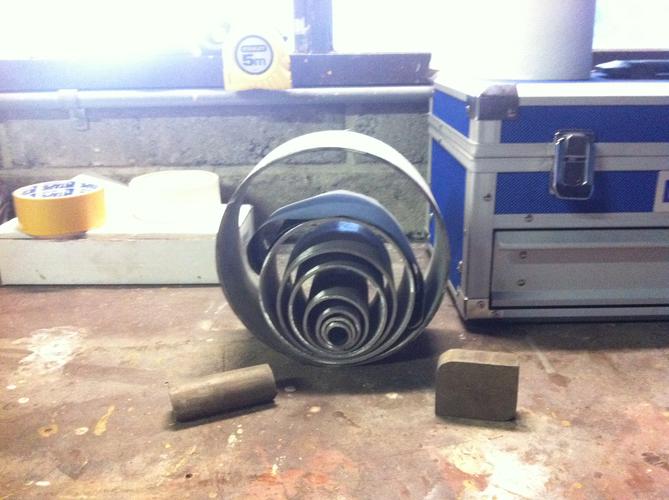Results 1 to 10 of 26
-
05-24-2015, 09:18 AM #1
 First grinder for restoring straights and making scales
First grinder for restoring straights and making scales
Time for a new challenge: restoring razors. I am looking for one machine that I can use for both restoring blades and making scales.
I am looking for a little grinder. You got wheel grinders, grinders with both a grinding wheel and a belt, some of them come with water cooling.
What would be the best for a beginner? What width of the grinding wheel do you recommend. And of course I'd like to be able to replace the grinding wheel with a buffing wheel. I would like the grinding wheelto be about 40 mm wide as well.
Any suggestions?
This is what I have in mind, sort of:
![Name: 14020_grimax150b_base[1].jpg
Views: 416
Size: 22.4 KB](https://sharprazorpalace.com/attachments/workshop/201938d1432459042-first-grinder-restoring-straights-making-scales-14020_grimax150b_base-1-.jpg) Plus ça change, plus c'est la même chose. Jean-Baptiste Alphonse Karr.
Plus ça change, plus c'est la même chose. Jean-Baptiste Alphonse Karr.
-
05-24-2015, 09:58 AM #2

Or this, brand is called Huvema. Unfortuntely the stone is only 20mm wide. I would prefer a 40 mm stone.
Plus ça change, plus c'est la même chose. Jean-Baptiste Alphonse Karr.
-
05-24-2015, 01:15 PM #3

I don't think a stone grinder is of any use for razors. The belt and flat wheel type are what most people use. Even those that make blades from scratch still use a belt for grinding.
Than ≠ Then
Shave like a BOSS
-
The Following User Says Thank You to Hart For This Useful Post:
Kees (05-25-2015)
-
05-24-2015, 02:52 PM #4Senior Member




- Join Date
- Feb 2013
- Location
- Haida Gwaii, British Columbia, Canada
- Posts
- 14,450
Thanked: 4829
If you are looking at a grinder for restores, what you are wanting to do is a full regrind, and it is kind of technical. I would not do it without some serious research and maybe some serious consultation with a razor maker. I am not sure either of those machines are really what you are looking for. There was a small grinder build thread not that long ago.
It's not what you know, it's who you take fishing!
-
-
05-25-2015, 04:32 AM #5

I use a belt sander strictly for making scales, wedges & a few other things but NEVER for re-finishing a blade!
-
The Following User Says Thank You to engine46 For This Useful Post:
Kees (05-25-2015)
-
05-25-2015, 06:29 AM #6

I have buffed & hand sanded vintage blades but no grinding on restores here either
I use several sized pipes as sanding blocks they work well

Last edited by Substance; 05-25-2015 at 09:15 AM.
Saved,
to shave another day.
-
-
06-02-2015, 04:24 AM #7Hones & Honing




- Join Date
- May 2005
- Location
- Saint Paul, Minnesota, United States
- Posts
- 8,023
- Blog Entries
- 1
Thanked: 2209
Hello Kees

If your going to restore razors are you thinking of removing all pitting? If so then you have 2 options, 1. sandpaper of different grits or 2. greaseless buffing compound using the various grades of grit.
e
Sandpaper requires that you use a slow RPM, say 200-600 rpm. To restore a 9/16 blade you will need a wheel of not more than 1.75" diameter to fit in the major hollow of the blade. Sandpaper is the fastest method to remove pitting. You will need various wheel sizes for the different sizes and grinds. Make your own wheels with a hole saw.
I will try to get some pics of my current setup and post them here.
Please note that you will need 2 seperate machines. One for grinding and one for buffing.
The below link shows how I use a modified variable speed wood lathe for sanding razors.
https://flic.kr/p/aS7XRR
Greaseless buffing compound I have not worked with in about 5 years and only on fixed blade hunting knives. Some one else can fill you in on the wheel size and rpm speed.Last edited by randydance062449; 06-02-2015 at 04:29 AM.
Randolph Tuttle, a SRP Mentor for residents of Minnesota & western Wisconsin
-
-
06-02-2015, 06:23 AM #8

Great set-up Randy! I was thinking of something more modest. How do you make sure you don't overheat the razor and destroy its temper? Can you use coarse grit buffing compound to remove pitting or would you sand the blade first?
Plus ça change, plus c'est la même chose. Jean-Baptiste Alphonse Karr.
-
06-02-2015, 06:37 AM #9

Always keep a container right there with water in it to cool off the blade if it begins to get hot. You will need to experiment with different grit sandpaper or greaseless compound. There is a guy on here who showed how to restore a blade. I think this was it:
Straight Razor Restoration Start to Finish Video Series - Straight Razor Place Library
The main thing is you must have a container with plenty of water to cool the blade if it starts getting hot! You DO NOT want to alter the temper!
-
The Following User Says Thank You to engine46 For This Useful Post:
Kees (06-02-2015)
-
06-02-2015, 10:45 AM #10

He starts restoration with an 80 grit buffing wheel. Is that enough to remove deep pitting?
Plus ça change, plus c'est la même chose. Jean-Baptiste Alphonse Karr.


 47Likes
47Likes LinkBack URL
LinkBack URL About LinkBacks
About LinkBacks






 Reply With Quote
Reply With Quote


